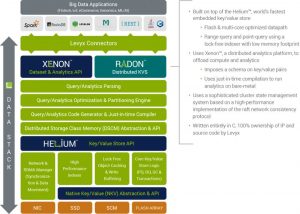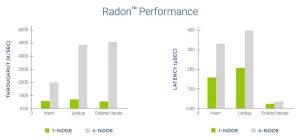Levyx: Availability of Radon for Early Beta Customers
Low-latency solution designed for +1000 node exascale opportunities
This is a Press Release edited by StorageNewsletter.com on July 22, 2018 at 2:16 pmLevyx Inc. announced the availability of its Radon for early beta customers.
Click to enlarge
Radon is a large-scale distributed key-value store intended for low latency operations and optimized for flash and non-volatile memories (NVMs), requiring much less DRAM and fewer nodes than in-memory solutions that have proven difficult to scale. It is engineered for exascale use cases requiring +1000 node clusters such as financial services, IoT, including connected car initiatives, telecommunications, cybersecurity and data center management – all of which involve storing, analyzing, and retrieving billions to trillions of objects with low latency.
Bill Moore, Dell/EMC fellow, co-creator of ZFS, and founder and CEO, DSSD, said: “The rise of massively scaled applications that process billions of objects related to sensor data, connected cars, threat detection, and dynamic pricing has created a fundamental need for a software stack that provides scalable and low-latency building blocks for these applications, while at the same time using commodity off-the-shelf hardware and storage. Levyx has done a great job to bridge this gap, thereby making these applications not only possible, but economically feasible as well.“
John Overton, CEO, Kove IO, Inc., a software-defined memory vendor said: “Mission-critical commercial and public-sector customers require QoS that are best-of-breed today for both cost and performance. Radon brings enterprise feature sets to large-scale distributed real-time analytics, without concerns for scale. It’s important to us that Levyx’s technologies have been proven in some very demanding use cases.“
Pete Goddard, CEO, Deephaven Data Labs, a FinTech research-platform-as-a-service company, said: “Radon is a state-of-the-art key-value solution that’s engineered for environments like ours in the Derivatives industry. It’s ability to help us store, track and process time-sensitive data across global networks can prove to be game-changing for the major players in our industry.“
Tim Marsh, CEO, Serisys Solutions Ltd., a FinTech solutions provider, said: “As a provider of core applications to some of the world’s leading financial institutions, we at Serisys see xcellent opportunities to apply Levyx’s distributed key-value solution on a grand scale. One such opportunity that we are targeting together is bringing major efficiencies to Java-based Enterprise applications through a very low latency persisted distributed object cache.“
Radon leaps ahead of existing distributed key-value systems by breaking the +1000 node barrier and exabyte data capacity limit while providing sustained performance. To achieve this, every core subsystem of Radon (e.g., distributed consensus algorithm, synchronization mechanisms, cluster-wide locking primitives, remote-procedure-call pipelines, consistent hashing scheme, etc.) had to be reenvisioned. An innovation in architecting Radon was to distribute objects uniformly across a very large cluster, enabling high performance point operations, while also devising mechanisms to perform efficient range-query and ordered traversal of data. Radon’s performance profile is high enough to address the needs of applications demanding in-memory data access speeds at flash/NVM memory persistency and operating costs.
Click to enlarge
In recent testing, four billion 500B objects were processed by Radon on a 12-node cluster consisting of AWS instances using flash SSDs. For processing workloads similar to a heavy transactional object storage use case, Radon was able to process nearly two million inserts/second and approximately five million lookups/second, both with latencies of less than 400μs and five million ordered iterates/sec with latencies of less than 40μs.
Performance thresholds improved an average of 6X when expanding from three nodes to twelve distributed nodes, demonstrating Radon’s scalability and potential for high nodal density in processing massively distributed workloads, whereby performance improves (better than) linearly as nodes are added while keeping latency in check.
Reza Sadri, CEO, Levyx, said: “Radon is the next evolution of our product capabilities. It combines our ultra-fast Helium key-value store and our Xenon analytics platform in a distributed object store solution with enterprise reliability. Whereas our previous products were enabling technologies, Radon is a point solution that can be applied to solve major problems in the world’s most demanding datacenters – unifying a wide spectrum of workloads, including transactions and analytics, in a distributed cluster at EB scale and on persisted media, bringing enterprise characteristics to very large live datasets. This solution will be an excellent software complement to our partners’ current and next-generation NVMe drives, storage-class memory (SCM), and all-flash arrays.“
Built on top of the company’s Helium, a fast embedded key/value store solutions, Radon is optimized for low latency inserts, lookup and iterate operations, non-volatile memory (NVM) storage fabrics such as NVMe flash and SCM and serves as a data-centric compute offload. Unlike Helium and other single node KVS object stores, it offers a set of enterprise features including replication, elasticity, consistency, and support for transactions.
In addition, it uses the firm’s Xenon, a distributed analytics platform, to offload compute and analytics and imposes a schema on key/value pairs to apply just-in-time compilation to run analytics on bare-metal. Finally, Radon is written entirely in C and is backed by 16 patents and patent applications.















 Subscribe to our free daily newsletter
Subscribe to our free daily newsletter

